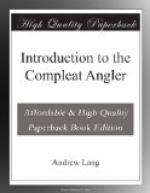On August 9, 1683, Walton wrote his will, ’in the neintyeth year of my age, and in perfect memory, for which praised be God.’ He professes the Anglican faith, despite ’a very long and very trew friendship for some of the Roman Church.’ His worldly estate he has acquired ’neither by falsehood or flattery or the extreme crewelty of the law of this nation.’ His property was in two houses in London, the lease of Norington farm, a farm near Stafford, besides books, linen, and a hanging cabinet inscribed with his name, now, it seems, in the possession of Mr. Elkin Mathews. A bequest is made of money for coals to the poor of Stafford, ’every last weike in Janewary, or in every first weike in Febrewary; I say then, because I take that time to be the hardest and most pinching times with pore people.’ To the Bishop of Winchester he bequeathed a ring with the posy, ‘A Mite for a Million.’ There are other bequests, including ten pounds to ‘my old friend, Mr. Richard Marriott,’ Walton’s bookseller. This good man died in peace with his publisher, leaving him also a ring. A ring was left to a lady of the Portsmouth family, ‘Mrs. Doro. Wallop.’
Walton died, at the house of his son-in-law, Dr. Hawkins, in Winchester, on Dec. 15, 1683: he is buried in the south aisle of the Cathedral. The Cathedral library possesses many of Walton’s books, with his name written in them. {5} His Eusebius (1636) contains, on the fly-leaf, repetitions, in various forms, of one of his studied passages. Simple as he seems, he is a careful artist in language.
Such are the scanty records, and scantier relics, of a very long life. Circumstances and inclination combined to make Walpole choose the fallentis semita vitae. Without ambition, save to be in the society of good men, he passed through turmoil, ever companioned by content. For him existence had its trials: he saw all that he held most sacred overthrown; laws broken up; his king publicly murdered; his friends outcasts; his worship proscribed; he himself suffered in property from the raid of the Kirk into England. He underwent many bereavements: child after child he lost, but content he did not lose, nor sweetness of heart, nor belief. His was one of those happy characters which are never found disassociated from unquestioning faith. Of old he might have been the ancient religious Athenian in the opening of Plato’s Republic, or Virgil’s aged gardener. The happiness of such natures would be incomplete without religion, but only by such tranquil and blessed souls can religion be accepted with no doubt or scruple, no dread, and no misgiving. In his Preface to Thealma and Clearchus Walton writes, and we may use his own words about his own works: ’The Reader will here find such various events and rewards of innocent Truth and undissembled Honesty, as is like to leave in him (if he be a good-natured reader) more sympathising and virtuous impressions, than ten times so much time




